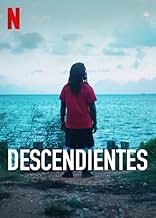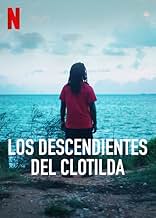IMDb RATING
7.1/10
1.5K
YOUR RATING
Follows descendants of the survivors from the Clotilda, the last ship that carried enslaved Africans to the United States, as they reclaim their story.Follows descendants of the survivors from the Clotilda, the last ship that carried enslaved Africans to the United States, as they reclaim their story.Follows descendants of the survivors from the Clotilda, the last ship that carried enslaved Africans to the United States, as they reclaim their story.
- Awards
- 7 wins & 24 nominations total
- Director
- Writers
- All cast & crew
- Production, box office & more at IMDbPro
Featured reviews
Slavery was one of the most important, and most disgraceful, parts of US history. Most of the focus on it emphasizes the plantations, the whipping of the enslaved African-Americans, and the Underground Railroad. A lesser known part is the slave trade itself. Outlawed in 1808, it continued in secret. The last ship to bring kidnapped Africans to the United States was the Clotilda, which docked in Mobile, Alabama, before getting sunk to hide its violation of the ban on slave-trading.
Margaret Brown's "Descendant" focuses on this, as well as the descendants of the enslaved people on the Alabama coast. It's a fascinating look at the aftermath of slavery, and how the descendants of the slaveowners are the biggest landholders in the area. Not to mention the chemical refineries dumping all sorts of toxins.
This is not a documentary that you'll forget anytime soon. I recommend it.
Margaret Brown's "Descendant" focuses on this, as well as the descendants of the enslaved people on the Alabama coast. It's a fascinating look at the aftermath of slavery, and how the descendants of the slaveowners are the biggest landholders in the area. Not to mention the chemical refineries dumping all sorts of toxins.
This is not a documentary that you'll forget anytime soon. I recommend it.
I found this to be a fascinating documentary, that held my attention throughout.
That said, it left me with some unanswered questions, in part because of its format, which focused on interviews with people who lived in Africatown, near where the Clotilda, evidently the last slave ship to arrive in the United States, landed.
I can completely understand why the director and producer would want to give these people a chance to express their views and feelings. They had been ignored for so long.
And I know that documentaries can only be so long before viewers start to turn out and off.
But I would have liked more background about a variety of issues. Do we know anything about the Clotilda's route to the States? Do we know where in Africa it left from? Have any of the descendants taken DNA tests that would help with this?
What was life like for the descendants of the original slaves between the time of Emancipation and today?
And on and on.
None of that is a criticism of the movie, which I enjoyed very much. But because the story it told is so interesting, it left me wanting to know so much more.
That said, it left me with some unanswered questions, in part because of its format, which focused on interviews with people who lived in Africatown, near where the Clotilda, evidently the last slave ship to arrive in the United States, landed.
I can completely understand why the director and producer would want to give these people a chance to express their views and feelings. They had been ignored for so long.
And I know that documentaries can only be so long before viewers start to turn out and off.
But I would have liked more background about a variety of issues. Do we know anything about the Clotilda's route to the States? Do we know where in Africa it left from? Have any of the descendants taken DNA tests that would help with this?
What was life like for the descendants of the original slaves between the time of Emancipation and today?
And on and on.
None of that is a criticism of the movie, which I enjoyed very much. But because the story it told is so interesting, it left me wanting to know so much more.
I've never heard of this - I've got no real expectations, but it doesn't exactly sound like a giggle.
It tells the story of the Clotilda/Clotilde (the spelling seems uncertain), a slave ship organised for a bet by a white landowner after slavery had been abolished. This brought 110 Africans to Alabama - and was then burned and sunk leaving no evidence it ever existed, except for a load of people who'd been threatened with lynching if they ever spoke about it. But they told their children, and their children's children, and - well, you get the idea! And now their 6x great-grandchildren are telling us their stories.
Unfortunately, because the ship was burned and sank, there's absolutely no physical evidence that any of this happened - so part of the film focusses on efforts to find the wreck, but when you look at a map of the Mobile river you can't help but feel their chances are somewhat limited (no spoilers as to whether they found it though!). And they also interview quite a few people that have no interest in finding it - as one lady puts it "how do I put this? I just don't care". But might she change her mind?
The film also considers other elements of the history of the community - it makes an interesting point that a lot of the surrounding land is used for heavy industry which has resulted in various health issues - and the land is owned by the descendants of the landowner that originally brought the slaves over, so history (once again) shows its nasty habit of repeating itself. And then talk turns to reparations...
What are reparations supposed to provide? Justice? Punishment? Closure? Whilst crimes can't be inherited by descendant, assets and hardship certainly can, so what value should be placed on them? If reparations are made, who do they go to? And given that the landowner's descendants have absolutely no interest in engaging in any dialogue, how could they even be possible?
The film certainly poses some interesting questions although it probably won't surprise you hear that it doesn't answer them - that's probably asking a bit too much from a 109 minute Netflix documentary. The film does manage to end on a positive note though - various people have hope for the future, whatever it might hold.
However, I also have to report that the interesting questions don't fill up a huge amount of those 109 minutes either - it's all very worthy, but unfortunately it's not exactly thrilling. It's most a lot of people just talking about stuff that means something to them but not a lot to anyone else or reading from a book. There's also a lot of repeated use of the same historical footage - it feels unfortunately like filler.
I feel a bit mean being nasty about what it obviously an important film for a lot of people - I know it never hurts for me to be educated in this stuff, but I'm afraid that just didn't really do it for me. It's diverting in places with some nice countryside (balanced by some very ugly urban scenes), but it's no more than that, I'm afraid. If, after that glowing recommendation, you still fancy watching it then it's on Netflix but there's much more interesting stuff on there.
It tells the story of the Clotilda/Clotilde (the spelling seems uncertain), a slave ship organised for a bet by a white landowner after slavery had been abolished. This brought 110 Africans to Alabama - and was then burned and sunk leaving no evidence it ever existed, except for a load of people who'd been threatened with lynching if they ever spoke about it. But they told their children, and their children's children, and - well, you get the idea! And now their 6x great-grandchildren are telling us their stories.
Unfortunately, because the ship was burned and sank, there's absolutely no physical evidence that any of this happened - so part of the film focusses on efforts to find the wreck, but when you look at a map of the Mobile river you can't help but feel their chances are somewhat limited (no spoilers as to whether they found it though!). And they also interview quite a few people that have no interest in finding it - as one lady puts it "how do I put this? I just don't care". But might she change her mind?
The film also considers other elements of the history of the community - it makes an interesting point that a lot of the surrounding land is used for heavy industry which has resulted in various health issues - and the land is owned by the descendants of the landowner that originally brought the slaves over, so history (once again) shows its nasty habit of repeating itself. And then talk turns to reparations...
What are reparations supposed to provide? Justice? Punishment? Closure? Whilst crimes can't be inherited by descendant, assets and hardship certainly can, so what value should be placed on them? If reparations are made, who do they go to? And given that the landowner's descendants have absolutely no interest in engaging in any dialogue, how could they even be possible?
The film certainly poses some interesting questions although it probably won't surprise you hear that it doesn't answer them - that's probably asking a bit too much from a 109 minute Netflix documentary. The film does manage to end on a positive note though - various people have hope for the future, whatever it might hold.
However, I also have to report that the interesting questions don't fill up a huge amount of those 109 minutes either - it's all very worthy, but unfortunately it's not exactly thrilling. It's most a lot of people just talking about stuff that means something to them but not a lot to anyone else or reading from a book. There's also a lot of repeated use of the same historical footage - it feels unfortunately like filler.
I feel a bit mean being nasty about what it obviously an important film for a lot of people - I know it never hurts for me to be educated in this stuff, but I'm afraid that just didn't really do it for me. It's diverting in places with some nice countryside (balanced by some very ugly urban scenes), but it's no more than that, I'm afraid. If, after that glowing recommendation, you still fancy watching it then it's on Netflix but there's much more interesting stuff on there.
This is truly, deeply, sincerely an important piece of US History and an amazing story. The Clotilda and Africatown are remarkable and should be revered. The Clotilda is an extremely rare find that should be a National Monument. But of course - this represents a lot more than just the story of a ship!
I live in Mobile. I know these places! There have been a couple of documentaries now, about the Clotilda - and I have been excited to see them both; however, unfortunately - I don't think anyone has quite hit the mark yet when it comes to telling and presenting this story with the impact it deserves, but this wasn't bad - I enjoyed it - the story and the people are incredible - but I'm still waiting for a Clotilda show that tells it all with the passion and excitement to do this justice.
I live in Mobile. I know these places! There have been a couple of documentaries now, about the Clotilda - and I have been excited to see them both; however, unfortunately - I don't think anyone has quite hit the mark yet when it comes to telling and presenting this story with the impact it deserves, but this wasn't bad - I enjoyed it - the story and the people are incredible - but I'm still waiting for a Clotilda show that tells it all with the passion and excitement to do this justice.
If a person knew very little about slavery and the slave trade, this documentary would be a great shock and revelation. Since my earliest student days, however, the slave trade between Africa and the "Americas" stood high profile with me. It still does.
By focusing on the voyage of the "Clotilda", it being the last or one of the last slavers, and the descendance of its human cargo, it manages to cover the utterly dismal topic sufficiently. Grinning white people in suits referring to the reconstructive drawing of the "Clotilda" as "Wonderful" have no place in this story. This story belongs to African Americans, and how they were so late in history, abducted to the Americas by greedy white men.
These same men, and they were men, who now hold all the money and land from this outrage now are riding a gravy train of financial advantage. Overall, the abomination against humanity that was the entirety of the Africa-Americas slave business will remain a bleeding sore on our society until reparations are made. Now that would be a wonderful picture.
(Irving Warner)
By focusing on the voyage of the "Clotilda", it being the last or one of the last slavers, and the descendance of its human cargo, it manages to cover the utterly dismal topic sufficiently. Grinning white people in suits referring to the reconstructive drawing of the "Clotilda" as "Wonderful" have no place in this story. This story belongs to African Americans, and how they were so late in history, abducted to the Americas by greedy white men.
These same men, and they were men, who now hold all the money and land from this outrage now are riding a gravy train of financial advantage. Overall, the abomination against humanity that was the entirety of the Africa-Americas slave business will remain a bleeding sore on our society until reparations are made. Now that would be a wonderful picture.
(Irving Warner)
- How long is Descendant?Powered by Alexa
Details
- Runtime1 hour 49 minutes
- Color
- Sound mix
Contribute to this page
Suggest an edit or add missing content

Top Gap
What was the official certification given to Descendant: les héritiers d'Africatown (2022) in Brazil?
Answer






















